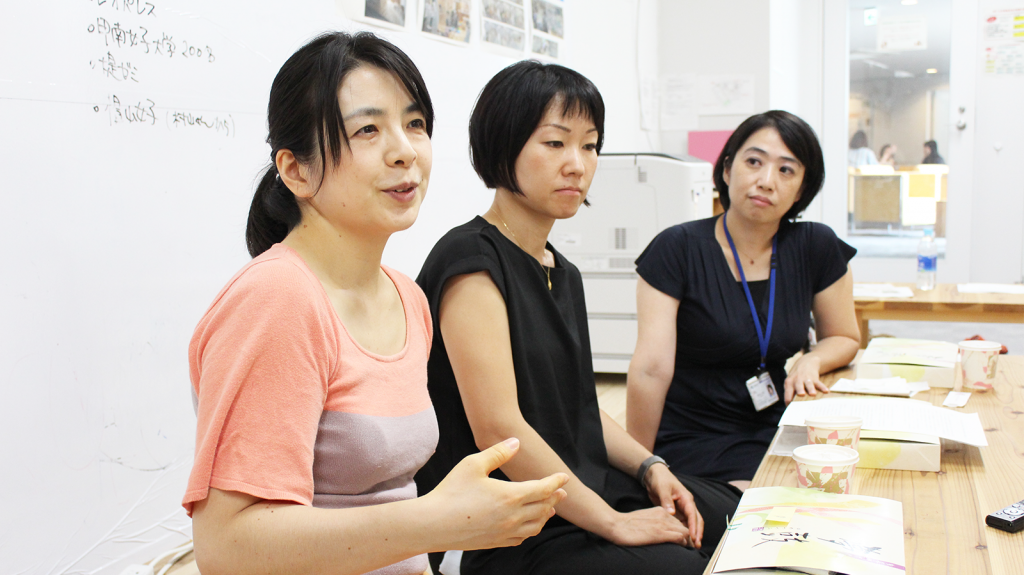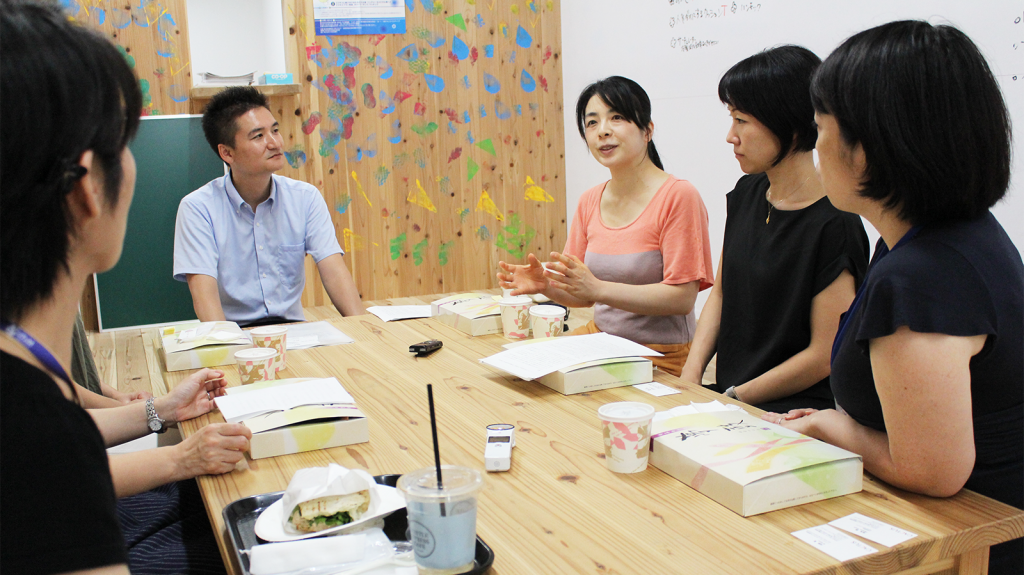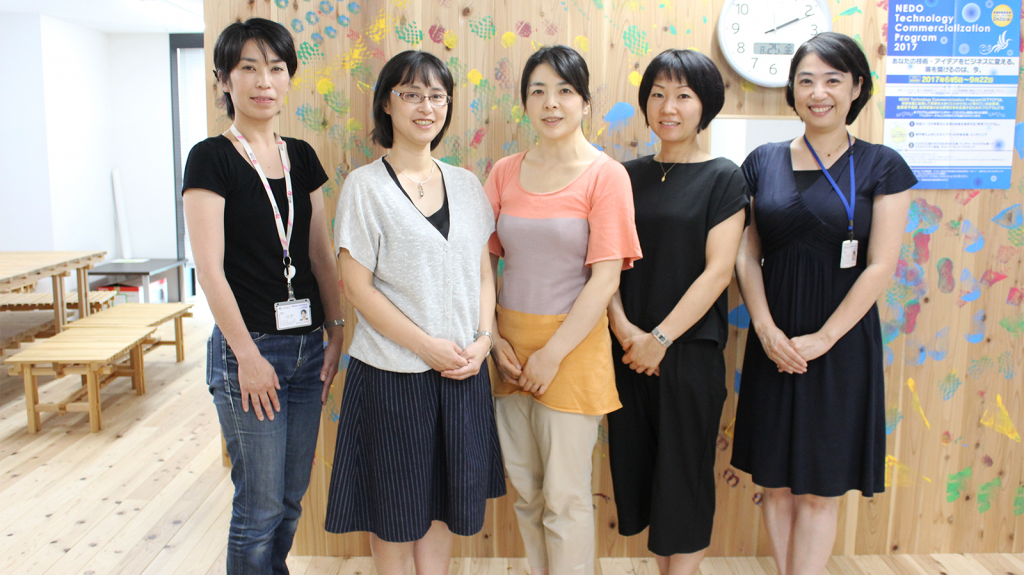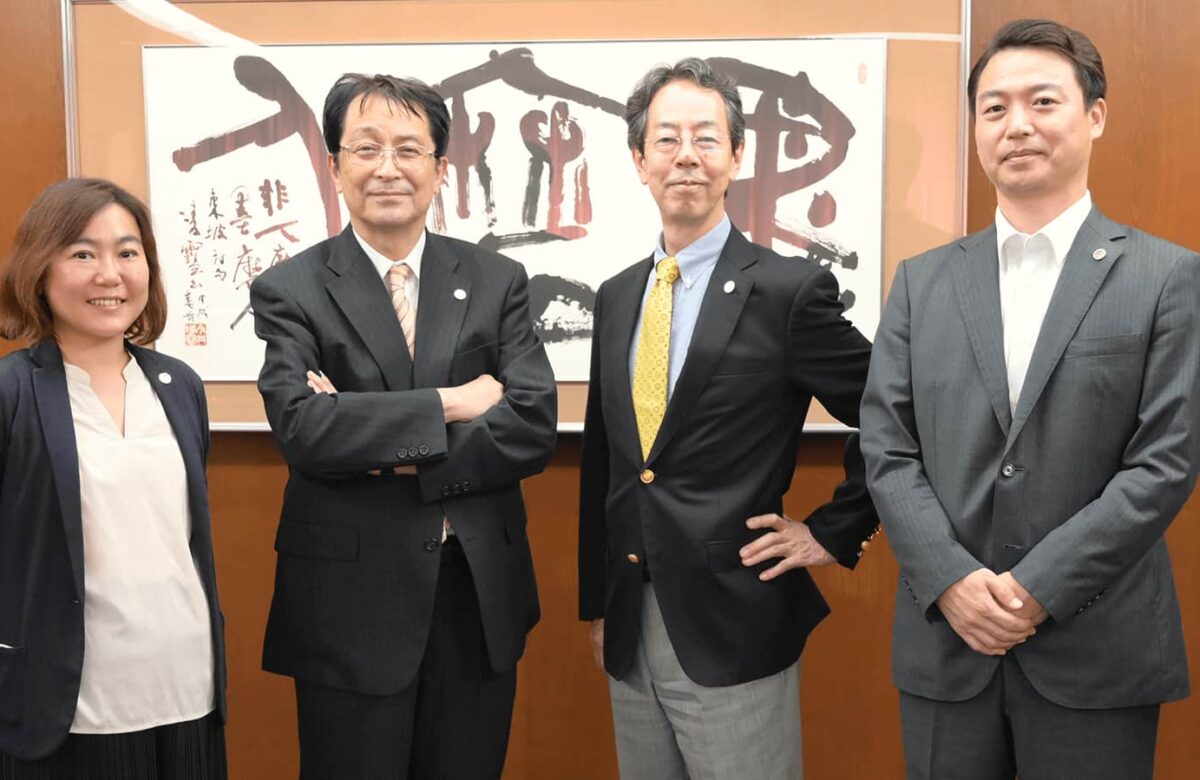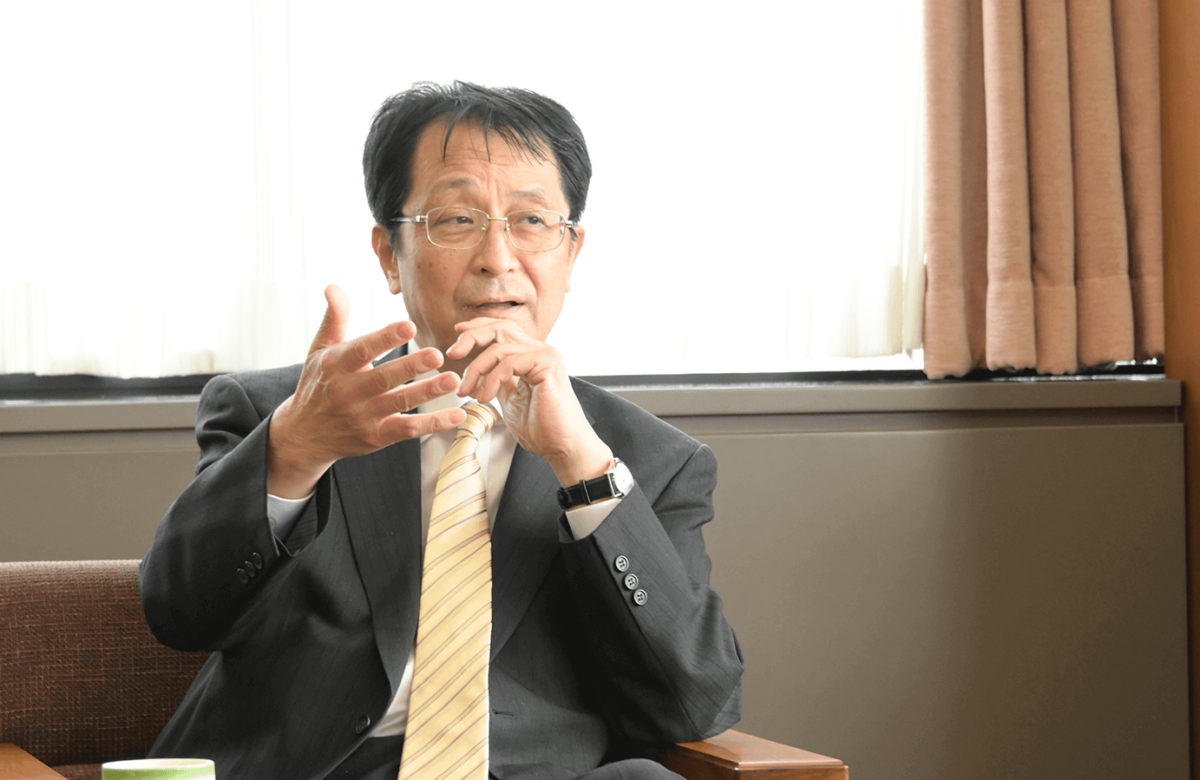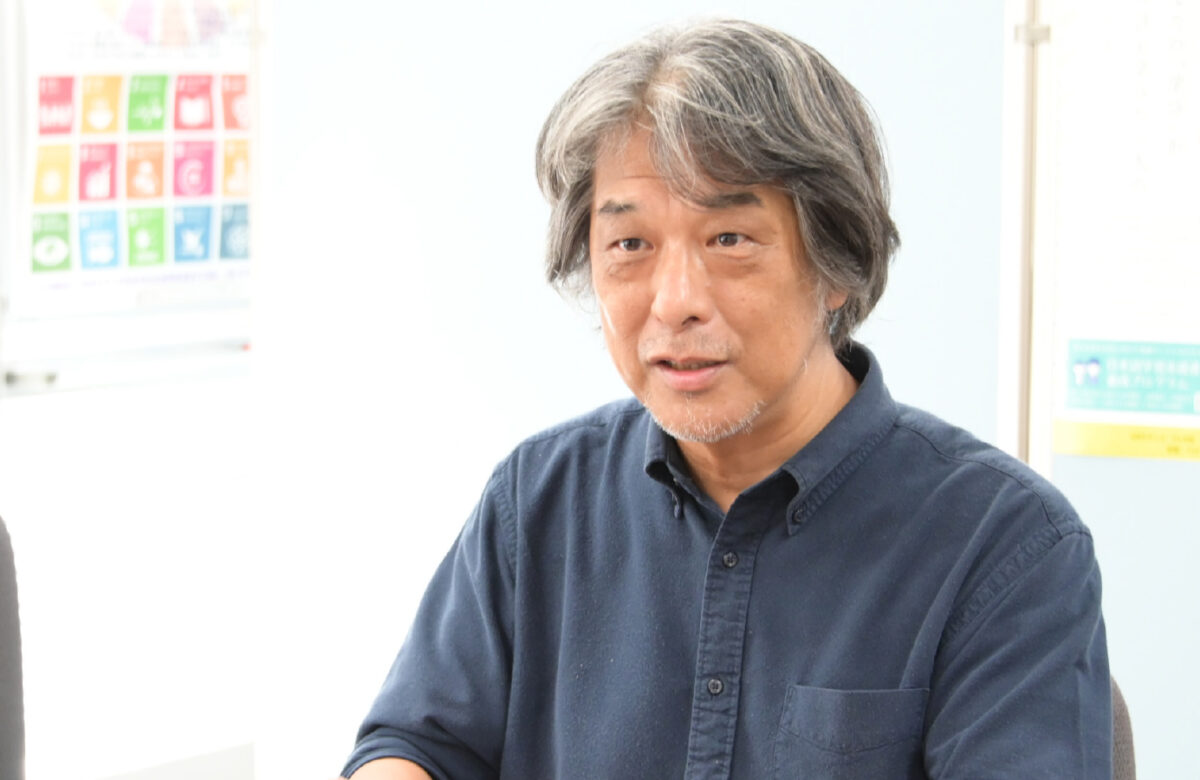Lessons in Solo Parenting from Women Academics
We spoke to some members about being a solo parent, activities in the community, careers as women academics, and more.
- UniversityArticleInterview
- September 1, 2018
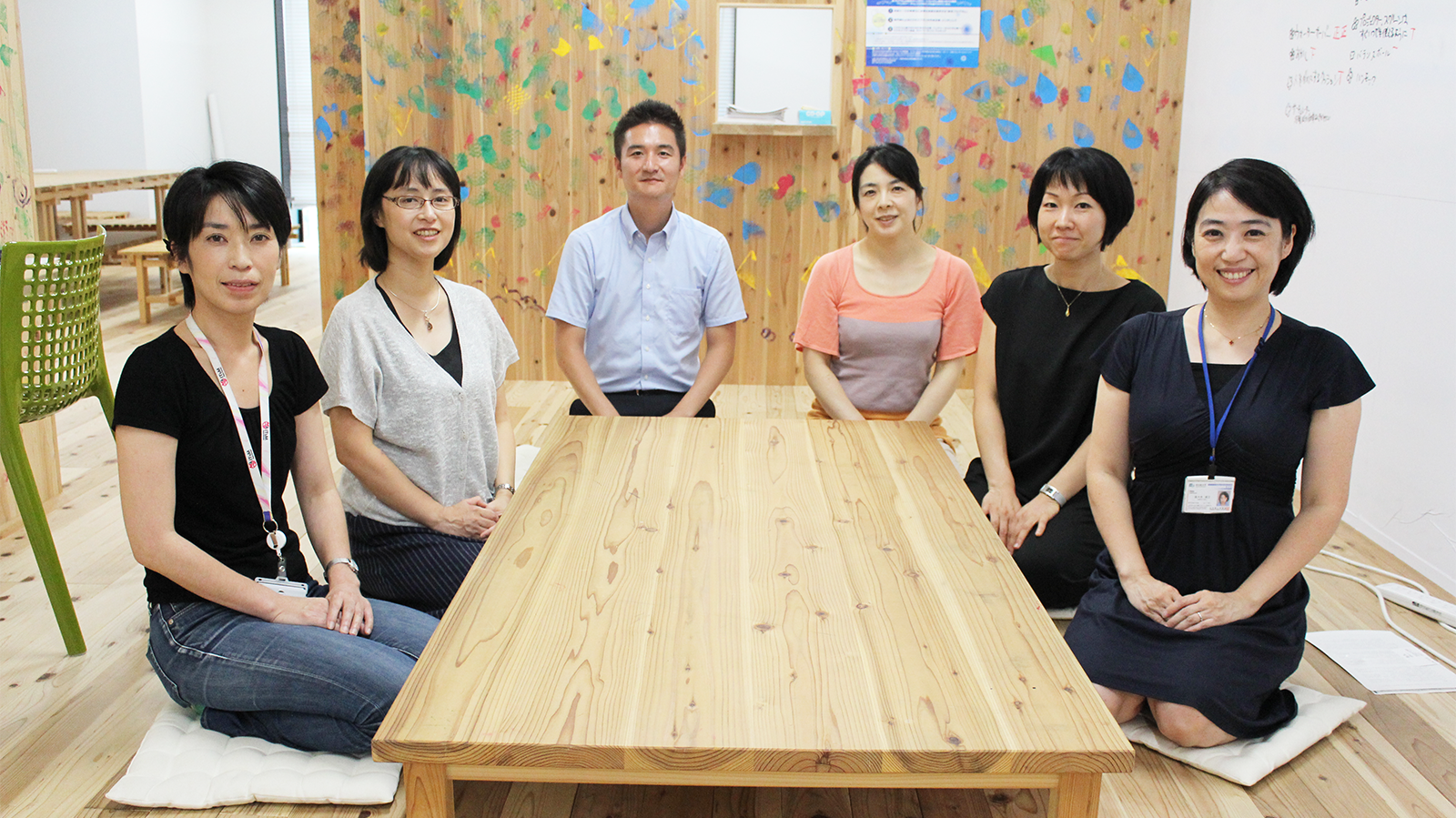
We had the opportunity to attend one of the community lunch meetings, during which we interviewed six of the community members. The women spoke about their experiences as solo parents, activities in the community, their private and professional lives, and careers as women academics.
All those with influenza type A, gather together!
How do members support one another?
Narie Sasaki: Someone sends an email saying, “What should I do about this problem?” and the other members reply. Each member will share their experience and offer advice, saying, “This is how we dealt with it in my case.”
Miho Tagawa: And then, we sometimes contact each other to arrange pickups for the children. Azusa, Noriko, and I have Grade 1 elementary school children, so we help out each other in the pick-ups and share our experience to a great extent.
Noriko Tanaka: Yes, it is important to keep in touch about each other’s children’s school situation.
Azusa Kamikouchi: An elementary school’s PTA is a minefield of tacit rules. This is my first child, so I had absolutely no idea what to expect at the school. Noriko is more experienced in this regard, so I seek her advice on various matters.
Narie Sasaki: It’s important to remember that we are not just a group of working mothers; we are university teachers as well. What makes our community such a great source of comfort is that when you have to work late because of a meeting or say other circumstances specific to the academic profession, you can be assured that the other members will understand your situation without you having to explain the details. If we were from different professions, we wouldn’t see eye to eye, and others could say, “Well, it’s different where I work.” You would just end up feeling exasperated.
Azusa Kamikouchi: Exactly. You can’t excuse yourself from your allocated lectures, and while there are some meetings you can avoid, there are others that you absolutely cannot. You see, this job has some unique features! (laughter)
Narie Sasaki: I’ll give another example, and this is interesting because it’s so typical of an academic. When there was an influenza outbreak, Miho sent a message saying, “My kid’s got a type A flu virus. Do anyone else’s kids have type A flu? Let’s take care of all those with type A flu together!” (laughter)Two people with the same type of influenza aren’t going to infect each other, right? So she said, “All those with type A gather together! All those with type B gather together!”
Miho Tagawa: Yes, I remember that. A small child gets sick so often. You get desperate because caring for a sick child prevents you from working. A male colleague, who doesn’t know a thing about parenting, one said, “Your child’s sick again? She seems to be sick all the time. Is everything okay?”(laughter)
Noriko Tanaka: I’ve received comments like that too! (laughter)
Miho Tagawa: I want to tell them that it is perfectly normal for children of that age to get sick frequently! (laughter) People with no experience of parenting don’t understand this.
How did you find out about the community?
Ayae Narutaki: When I accepted the job at Nagoya University, my eldest boy was two and the younger boy was nine months old. I had to live separately from my husband, and I was unsure whether it would be feasible to take such young children with me. But I then began to receive many emails from women academics in the same situation. They advised me on day-to-day matters and on where I should live. A professor contacted the Center for Gender Equality for me, and from there, I got in touch with the community. I was, therefore, able to take up my post with complete ease. And another thing—I now live in the same apartment house as Narie. It’s great to know that I’ve got someone close by to rely on.
That must be reassuring.
Ayae Narutaki: I was also able to start my lab/office smoothly. If you want to advance to the next rung of the academic career ladder, you have to look for suitable posts all over the country. If you let an opportunity pass, it will be years before another comes along. However, what made me decide to accept a job at Nagoya University was the university’s excellent research environment.
The importance of family support
How did your respective husbands react?
Ayae Narutaki: My husband didn’t seem surprised or shocked. He asked me to be honest about what I wanted, and said that he would respect and support my choices. So I talked through my decision to take the job at Nagoya University. He works for a firm in Tokyo and he visits me in Nagoya on the weekends.
Miho Tagawa: My husband was supportive too. He told me that he would take care of the children if I wanted. I thought that it wouldn’t be feasible as my youngest was still breastfeeding. So I said that I would take the children. But his supportive attitude was a major factor in me deciding to take up the post.
Do you know anyone who was unable to take an excellent job opportunity due to family commitments?
Azusa Kamikouchi: I know of quite a few women who limit their job search to Tokyo and its peripheries because their husbands insist that they live together. Granted, it might be nice for a family to live together under the same roof.
Miho Tagawa: When couples in academia stay together, the wife usually sacrifices a permanent position. Or she gets a non-academic job.
Narie Sasaki: Our members generally have very supportive husbands.
Miho Tagawa: My husband is an academic as well, but when he is home on the weekends, he takes charge of preparing meals, shopping, and looking after the children. Support from your husband and your parents/in-laws is essential to make solo parenting work. Living separately from your husband will only work out if everyone in the family is prepared to lend a hand in parenting.
Azusa Kamikouchi: My husband and Miho’s husband are friends. They get in touch on the weekends and take the kids out to play. Miho’s mother and mine became friends too recently. When the older generation becomes friends, it makes things even easier.
Subconscious gender bias
Do you know of any male academics in your situation?
Narie Sasaki: It is extremely rare for a man to take the children and raise them as a solo parent. By the way, didn’t you leave your children with your husband, Keiko?
Keiko Miyake: Yes. Since I moved out to take up my post, all the family members have helped one another. This has proved to be a growth opportunity for everyone concerned. That said, the burden on the family was greater than I expected, so our child came back to stay with me a couple of years later. At the time, my daughter was in the upper grade of elementary school. She told me that she didn’t want her friends knowing that I don’t live at the family home due to my work. She didn’t want her friends to think ill of the family. This hurt me deeply. Children have their own ideas and feelings, and it appeared that my daughter had internalized social norms about the family. This is one of the issues we need to address if women’s social positions are to improve.
Miho Tagawa: I agree. Children suffer when they absorb social biases and begin to believe that their family is abnormal because the mother lives elsewhere. I had a similar experience when I didn’t participate in the nursery’s jumble sale. My daughter said to me, “Why didn’t you come? Everyone else’s mom came.”
Azusa Kamikouchi: I had this experience when I didn’t attend the school’s open day. My daughter asked me why I didn’t attend. I told her that I had my own classes to attend to. She then asked, “How come you attend someone else’s class but not mine?” (laughter)
Miho Tagawa: Me too. My daughter cried because I didn’t attend. But if Japan had more two-parent working households, then our children wouldn’t feel so marginalized; they would see that several other mothers don’t turn up to these events due to their work commitments.
Narie Sasaki: My daughter once told me that she envies children whose mothers stay at home. I said to her, “Yes, but just imagine what it would be like if I was at home all the time. After you return home from school, I would constantly badger you about doing your homework. Would you like that?” My daughter said, “No way! It’s better that you keep working!” (laughter)
Azusa Kamikouchi: When children ask you about something they are curious about, the way you reply is all-important!
Narie Sasaki: I want children to think that working mothers are cool. Conversely, they should also think it odd if only the mother attends the PTA or only the mother packs their lunch; they should be thinking, “That kid’s got a weird family—the father never does these things.”
Misconceived “career support”
Noriko Tanaka: The existing system of career support for mothers seems outdated to address the real needs of present-day mothers. I gave birth and began childrearing when I was moving from one post to another as a post-doctorate researcher and corporate researcher. I was asked to leave my job because of my pregnancy. On the other hand, when I was raising my child, I was excused from certain duties at work and reallocated to an easier position, all in the name of employee welfare. I was unhappy about this. I wanted to pursue research and take on challenging work despite bringing up my child. I felt that working was futile if it brought me no job satisfaction.
Narie Sasaki: They transfer you to a position that’s cushy but dissatisfying. As well-meaning as this measure may be, it misses the mark for women who are devoted to their research and want to advance their careers.
Noriko Tanaka: Exactly. It offers no real benefit to those who need career support. In the name of career development, they promote you to a higher position and raise your salary, but all of this is meaningless if the work itself isn’t interesting. Dissatisfied with my job, I resolved to take a job at Nagoya University and to live separately from my husband with the kids.
Did anyone in your family oppose your decision?
Noriko Tanaka: Actually, the offer from Nagoya University was the second offer I received where I had to decide if I wanted to take my kids and live separately from my husband. When the first offer came, my mother-in-law voiced opposition, so I gave up on the idea. But then I felt that I just couldn’t abandon the plan. I felt that I wouldn’t get another opportunity like this [referring to the second offer], so I tried to persuade her of the idea. My husband had earlier lived separately from the family home for his work, and I thought that it was strange that I alone should encounter opposition for doing the same thing. Living separately proved beneficial to the family too. Previously, my husband hardly ever left the house during the weekends. But I was pleasantly surprised to find that he has now started taking the kids swimming or to the park, and even started cooking meals.
Narie Sasaki: I guess that when you can’t see each other all the time, it makes you appreciate your family all the more.
A surplus of talented women
My company now has an 80% female workforce. It seems that women are more motivated than men and prioritize job satisfaction over pay.
Azusa Kamikouchi: In other words, there is a surplus of talented women. Of course, there are plenty of talented men as well, but there are even more talented women who are not used to their full potential. The organizations that can attract this talent will have a competitive advantage in the future.
Narie Sasaki: Men do not have the option to not work, so workplaces consist of both competent men and those who are not so competent. I say that highly motivated women should be allowed to work to their full potential and that unmotivated men should stay at home! (laughter)
Miho Tagawa: Several talented women spend all their time at home caring for their children. But it would benefit the children if these women leave their homes and use their talent
Narie Sasaki: When I returned to work two months after giving birth and sending my child to nursery, one of my students showed me his dissertation. It was a study in which mother mice were separated from their litters. The results indicated that a certain period of separation each day had a beneficial effect: the mother mice developed a closer relationship with their litters compared to other mother mice who had not been separated. So the student told me not to worry about living apart from my child because, after all, biological evidence proved its benefits. Sure enough, when I picked up my child from nursery, I found that she was even dearer to me compared to when I had dropped her off! (laughter)
Miho Tagawa: When you spend time apart from your child, it makes you value the time that you spend together all the more.
Azusa Kamikouchi: That’s right. There are all sorts of benefits.
Narie Sasaki: In the past, I was so overworked that I doubted whether I could really have a child. My supervisor patted me on the back, saying, “What are you saying? Of course, you can have a child! Children don’t belong to you; they belong to society. It’s wrong to think that you can bring up a child on your own.”
Azusa Kamikouchi: I know what you mean. I understood that parenting is something you do with the support of various people.
Narie Sasaki: True. The idea that you merely create a copy of yourself is disturbing to me. It is much better to think that many people help the child grow. At home, someone from the elderly employment center does all my housework and looks after my daughter when she returns home. You can solve parenting issues by creating a family for the child in the community.
Miho Tagawa: Children grow up on their own, don’t they? Leave them to it, and they will go further ahead.
Narie Sasaki: When I left my daughter to her own devices, she made marshmallows with her friend, and they sold them in the street. She was delighted when they sold marshmallows for 1 yen! (laughter)
Azusa Kamikouchi: 1 yen? That’s far too cheap! I wonder if the people who bought them felt awkward about eating them! (laughter)
Narie Sasaki: As parents, we would have surely put a stop to it if we were there, but they were so happy to have sold their marshmallows (laughter). You really have no idea what children are going to do next.
Money matters
Do you face any concerns that are particularly specific to solo-parenting academics who are solo parents?
Narie Sasaki: One such problem is not having too much money to spare. Despite having a double income, we have to maintain two homes, and the transport costs for visiting each other are not small. Unlike companies, universities do not provide any allowance because they consider separate living arrangements as a matter of personal choice and convenience.
Azusa Kamikouchi: I figured out that I spent over a million yen on shinkansen trips in one year!
Miho Tagawa: I spent over two million yen! I have to arrange travel for two people: my mother, who comes to help me out, and my husband.
Narie Sasaki: When the child takes ill, I have to hire a babysitter or arrange for one of my parents to come over, which means shelling out some 10,000 yen in one day. This is why we are thinking about home-sharing options for academics in our situation. All the women academics who are solo parents can rent an apartment in the same house. I feel we should all pitch in to rent an apartment that we can use as a shared space. We can then hire people from the nearby elderly employment center to look after the children and cook them meals. We can take turns to drop off and collect the children. After school, the children can come to the shared space and play and eat under the supervision of the people from the elderly employment center. Don’t you think that’s a great idea?
Ayae Narutaki: That would be wonderful!
Miho Tagawa: We can’t wait for the university to organize this; we have to do it ourselves.
Narie Sasaki: Exactly. My dream is for us to occupy one apartment after another until we have monopolized the entire building or our members! (laughter)
Keiko Miyake: That’s a great idea! When your kids get older, you can then hand over the apartment to new mothers who are academics.
Narie Sasaki: That would be great! Even if you have only one child, you still have to spend energy and money for things like hiring a babysitter, picking up and dropping off the child, cleaning, cooking, and everything else. But if everyone lives in the same place, you can help each other out. I would like such a system.
Bringing your child to work
How often can you bring your child to your workplace?
Miho Tagawa: After I gave birth to my second daughter, I started guiding one of my graduate students in writing a dissertation. I gave verbal instructions while holding my newborn in my arms! (laughter) You can’t wait until the baby has grown up to resume your academic work. You have to constantly watch over and guide the student.
Azusa Kamikouchi: My husband and I bring our child to meetings of academic societies. We sit the child down on one of the seats in the lecture venue, and they listen to the lecture. Because the child watched me or my husband practicing the lecture at home, they interject at times during the lecture, saying, “Wait, that’s different from what you said at home!” This causes some giggling in the audience. (laughter)
Narie Sasaki: You can usually bring a child to seminars too. I once worked at Ochanomizu Women’s University, and that was even more amazing; I could bring my child to student presentations and thesis screening sessions and question the students while breastfeeding! (laughter)
You’d question the students while breastfeeding? How cool. Brave Ochanomizu University.
Miho Tagawa: I sometimes bring my older daughter to university meetings. Of course, there is also work that you can’t do with a child present: work requiring a lot of focus, writing papers, writing grant applications, and so on. So I try to finish all these in one batch when I leave
the children with my husband, and I prioritize my work. I then efficiently schedule all the tasks to fit in the time available for me.
Narie Sasaki: Anyway, the point is that you can bring your child to work! (laughter) When you start doing so, you’ll be surprised at what you can accomplish. Also, when you see someone else bringing their child to work, it gives you the confidence to do the same.
So the more you take the plunge and bring your child to work, the more it helps others feel comfortable about doing the same?
Azusa Kamikouchi: We need to gradually change people’s perceptions. Even on my days off, I often bring my child to my lab/office. It benefits both of us; my child plays with my students and it gives me a chance to get some work done. Most of all though, I want my students—both men and women—to see me bring the child to work, and to think about its significance. If I can make some kind of impression, then it will help change things for the better.
Keiko Miyake: Given that childbirth and parenting occupy so much of our time, we take longer to build a track record compared to our male counterparts. But I think we can catch up with and overtake men.
Azusa Kamikouchi: After all, we live longer than men.
Narie Sasaki: So you see, the most important thing is not to abandon your career. It’s fine to be a low-flyer for a while, but you should never abandon it. I want more female and male students to see how we strive to keep up with our jobs and to make sure we don’t quit while taking care of our children. Many women worry about whether they can balance their academic work with their family lives. To these women, I want to say: No problem. Look at me—even I am doing it! (laughter)
AYAE NARUTAKI
Ayae Narutaki is Associate Professor, Materials Chemistry, Graduate School of Engineering, Nagoya University. After working at Tokyo University’s Faculty of Engineering, she took up a post at Nagoya University and moved to Nagoya, bringing along her two-year-old and nine-month-old boys. Even when she lived with her husband, a company employee, Ayae found it tough to cope with her academic work while caring for an infant. She got in touch with the community before arriving at Nagoya and gathered a lot of useful information from academics who were solo parents, which helped her prepare for her new life.
NARIE SASAKI
Narie Sasaki is Associate Professor, Division of Biological Science, Graduate School of Science, Nagoya University. After working at Ochanomizu University, she was given a special appointment at Nagoya University at the same time that her husband took up a post there. Subsequently, she started working at the university’s Center for Gender Equality. She has devoted herself to supporting women academics and established Japan’s first on-campus nursery. Having returned to academic work, she now works as an associate professor at her husband’s lab/office. Alongside her duties, she advises women who are about to take an academic post at Nagoya University, and she acts as an intermediary for the community.
KEIKO MIYAKE
After working as an overseas academic, Keiko Miyake became a specially appointed professor at the gender equality offices of three universities. In this capacity, she has helped develop university support systems, drawing on her experience of working as an academic while raising a child. Keiko’s husband is also an academic. Along with pursuing her research in plants, Keiko examines ways to increase the effectiveness of university support. She focuses on catering more closely to the needs on the ground and balancing the perspectives of the support teams with those of the recipients.
NORIKO TANAKA
Noriko Tanaka is Associate Professor, Research Center of Health, Physical Fitness and Sports Division of the Science of Physical Fitness and Sports, Nagoya University. After leaving a fixed-term academic post due to her pregnancy, Noriko Tanaka was offered a Restart Postdoc Fellowship from the Japan Society for the Promotion of Science, after which she worked at several corporate research institutes. She then accepted a job at Nagoya University, perceiving this as her last opportunity to build a career. After moving to Nagoya with her two children, she was pleasantly surprised to find that her husband was supporting her with parenting and domestic chores. Noriko wants Japan to have better systems for supporting women who are determined not to abandon their academic careers. When she was selected for the 2016 Editage Grant by Cactus Communications, she introduced the Researchers’ Community for Child Care Support at Nagoya University in her interview.
MIHO TAGAWA
Miho Tagawa is Associate Professor, Center for Integrated Research of Future Electronics (additional post at the Graduate School of Engineering). After working as a researcher in the United States, she began working at Nagoya University in 2012. She is a mother to two daughters. Her husband and her parents live far away, so she is a solo parent on weekdays.
AZUSA KAMIKOUCHI
Azusa Kamikouchi is Professor at Graduate School of Science, Nagoya University. She studied in Germany and served as Assistant Professor at the Tokyo University of Pharmacy and Life Sciences before taking up a professorship at Nagoya University in 2011. She lives in Nagoya with her mother and daughter. Her daughter attends a local elementary school.
This article is a part of ScienceTalks Magazine issue The Friendly Solutions Proposed by the Researchers’ Community for Child Care Support at Nagoya University.




